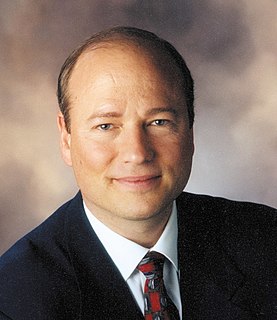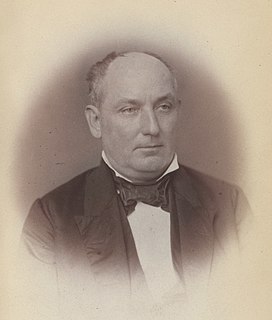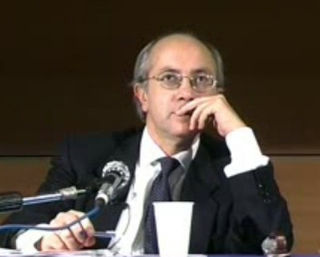A Quote by Thomas Huxley
Rome is the one great spiritual organisation which is able to resist and must, as a matter of life and death, the progress of science and modern civilization
Related Quotes
Many people correctly make the point that our only hope is to turn to God. For example, Charles Lindbergh, who said that in his young manhood he thought "science was more important than either man or God," and that "without a highly developed science modern man lacks the power to survive," . . . went to Germany after the war to see what Allied bombing had done to the Germans, who had been leaders in science. There, he says, "I learned that if his civilization is to continue, modern man must direct the material power of his science by the spiritual truths of his God."
If spiritual science is to do the same for spirit that natural science has done for nature, it must investigate quite differently from the latter. It must find ways and means of penetrating into the sphere of the spiritual, a domain which cannot be perceived with outer physical senses nor apprehended with the intellect which is bound to the brain.
What sets worlds in motion is the interplay of differences, their attractions and repulsions. Life is plurality, death is uniformity. By suppressing differences and pecularities, by eliminating different civilizations and cultures, progress weakens life and favors death. The ideal of a single civilization for everyone, implicit in the cult of progress and technique, impoverishes and mutilates us. Every view of the world that becomes extinct, every culture that disappears, diminishes a possibility of life
For Death must be somewhere in a society; if it is no longer (or less intensely) in religion, it must be elsewhere; perhaps in this image which produces Death while trying to preserve life. Contemporary with the withdrawal of rites, Photography may correspond to the intrusion, in our modern society, of an asymbolic Death, outside of religion, outside of ritual, a kind of abrupt dive into literal Death.
Internationalism is a community theory of society which is founded on economic, spiritual, and biological facts. It maintains that respect for a healthy development of human society and of world civilization requires that mankind be organized internationally. Nationalities should form the constitutive links in a great world alliance, and must be guaranteed an independent life in the realm of the spiritual and for locally delimited tasks, while economic and political objectives must be guided internationally in a spirit of peaceful cooperation for the promotion of mankind's common interests.
The ancients were destitute of many of the conveniences of life which have been invented or improved by the progress of industry; and the plenty of glass and linen has diffused more real comforts among the modern nations of Europe than the senators of Rome could derive from all the refinements of pompous or sensual luxury.
It is important that spiritual advancement must keep pace with material advancement. When this comes to be realized man's journey toward higher and more lasting values will show more marked progress while the evil in him recedes into the background. Knowing that material and spiritual progress are essential to man, we must ceaselessly work for the equal attainment of both. Only then shall we be able to acquire that absolute inner calm so necessary to our well-being.
We must ask whether our machine technology makes us proof against all those destructive forces which plagued Roman society and ultimately wrecked Roman civilization. Our reliance - an almost religious reliance - upon the power of science and technology to forever ensure the progress of our society, might blind us to some very real problems which cannot be solved by science and technology.
The science, the art, the jurisprudence, the chief political and social theories, of the modern world have grown out of Greece and Rome-not by favour of, but in the teeth of, the fundamental teachings of early Christianity, to which science, art, and any serious occupation with the things of this world were alike despicable.
What is of the nature of spirit and soul must be gleaned from facts belonging to the spirit and soul; we shall then know that in the living thinking which is liberated from the will, a life-germ has been discerned which passes through the gate of death, goes through the spiritual world after death, and afterwards returns again to earthly life.
There are some whose Karma is such as to enable them to develop the purely spiritual faculties first of all -- to overleap the astral plane for the time, as it were; and when afterwards they make its acquaintance they have, if their spiritual development has been perfect, the immense advantage of dipping into it from above, with the aid of a spiritual insight which cannot be deceived and a spiritual strength which nothing can resist.
In all social systems there must be a class to do the menial duties, to perform the drudgery of life. That is, a class requiring but a low order of intellect and but little skill. Its requisites are vigor, docility, fidelity. Such a class you must have, or you would not have that other class which leads progress, civilization, and refinement.
We must seek support in the moral values that have ensured the progress of our civilization. Honesty and hard work, responsibility and faith in our strength are bound to bring us success. There should be no place for despondency. The crisis can and must be fought by uniting our intellectual, spiritual and material resources.
The fact is that philosophy has been a decisive source of inspiration in all the great crises that Europe has faced. It has been so in the time that preceded the fall of the Roman Empire, when Augustine of Hippo delineated the features of a new spiritual civilization; in the age of religious wars, when Descartes and Hobbes established the principles of modern science and politics; and at the turn of the French Revolution, interpreted by Kant and Hegel as an event destined to change the history of the world.


































